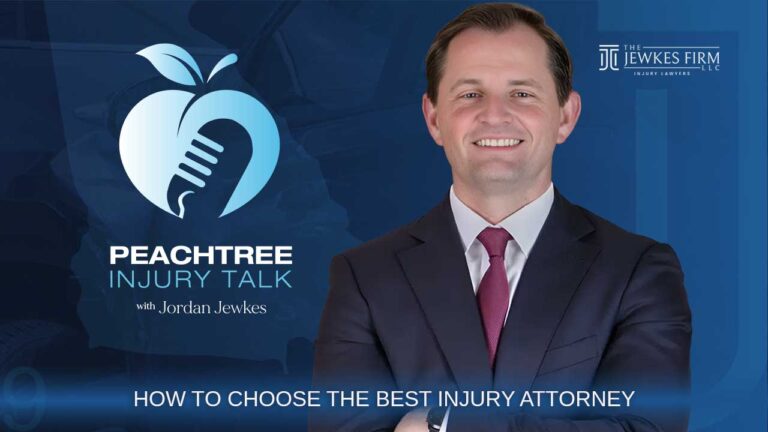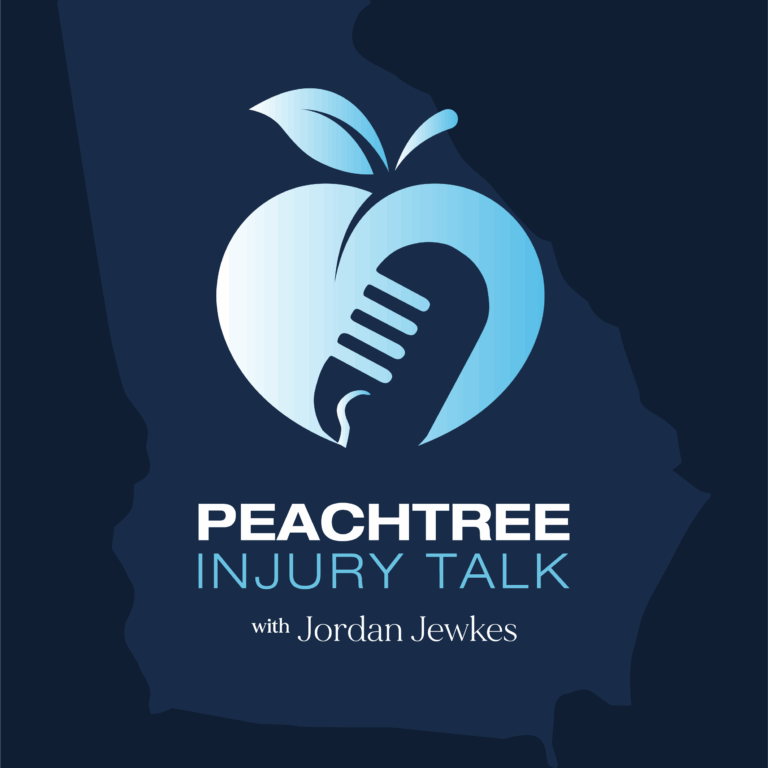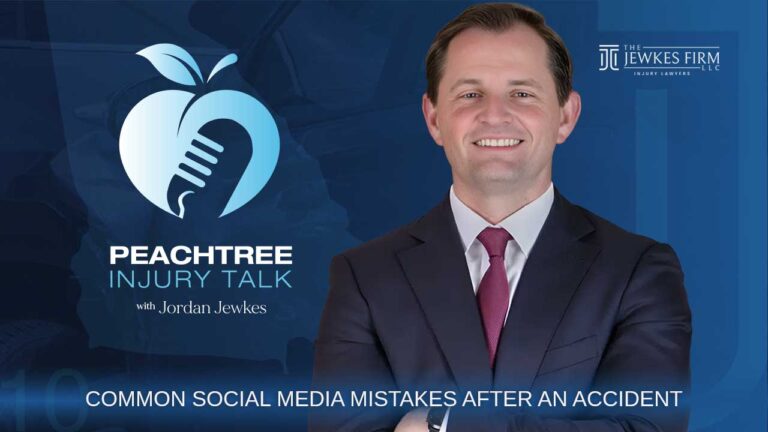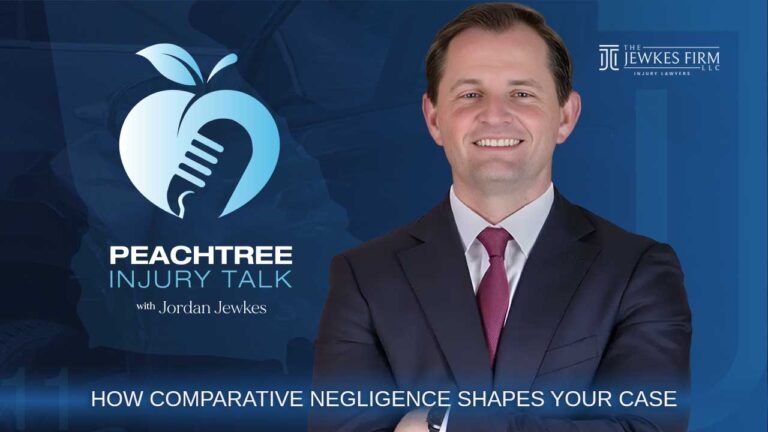| 00:00 |
Narrator: Welcome to Peachtree Injury Talk with attorney Jordan Jewkes.
|
| 00:05 |
Katie Roberts: Welcome to Peachtree Injury Talk with attorney Jordan Jewkes. Jordan strives to give injured victims a voice and provide strong advocacy against an often broken system. I'm your host, Katie Roberts, and today's episode is The Hidden Costs of Personal Injury: How Medical Bills, Lost Wages, and Emotional Strain Add Up. Thank you, Jordan, for joining us today.
|
Peachtree Injury Talk |
| 00:31 |
Jordan Jewkes: Yeah, thanks for having me, Katie. Glad to be here.
|
| 00:33 |
Katie Roberts: Okay, burning question—how do medical expenses, both immediate and long-term, impact the overall financial burden of someone recovering from an injury?
|
| 00:45 |
Jordan Jewkes: Great question, and a good place to start. One of the most basic elements of any injury claim is that you're allowed to collect your medical bills if they were caused by someone else's negligence.
So let’s say you’re in a car wreck—classic example. You might see a chiropractor, a physical therapist, maybe even an orthopedist. And heaven forbid, you might need surgery. Every case is different, but medical treatment and bills are usually part of it.
What most people don’t realize is you’re also entitled to recover future medical expenses. If a doctor says, “Katie, you’ve been in a serious wreck, and while you're managing now, your spine may continue to deteriorate and you’ll likely need injections or surgery later”—well, the law allows you to recover for that future treatment, too.
So it’s not just about past medical costs. A good settlement should account for what's coming down the road. That’s why we try to get doctors to estimate future care so clients can set aside money for it.
|
Peachtree Injury Talk |
| 02:07 |
Katie Roberts: That’s so interesting. I had no idea you could build that into a settlement based on how injuries might progress. You mentioned chiropractors and orthopedists—does going to one versus the other hold more weight in a claim?
|
| 02:35 |
Jordan Jewkes: It depends on what you mean by “more weight.” Chiropractors can treat soft tissue injuries and do physical manipulation, but they can’t prescribe medication or perform surgery. So if it’s a minor injury, a chiropractor might be sufficient.
But if you’re still having issues two or three months in—or you need imaging like an MRI—then seeing an orthopedist is a good idea. Orthopedists are medical doctors, so if they’re involved, that usually indicates a more serious injury. Their input can also strengthen your claim.
|
| 03:34 |
Katie Roberts: That makes sense. I mentioned in our last episode that my friend went to a chiropractor first, but her condition worsened and she had to see an orthopedist. The defense tried to argue the chiropractor caused more damage.
|
Peachtree Injury Talk |
| 03:56 |
Jordan Jewkes: That’s really rare. What usually happens is the person underestimates the injury early on. No one wants to give up their daily routine or admit something’s seriously wrong, so they downplay it. They see a chiropractor a few times, but when it doesn’t improve—or worsens—they realize the injury’s more serious than they thought.
That’s not the chiropractor’s fault—it’s just that the injury needed a higher level of care. But yes, insurance companies will absolutely try to weaponize that against you. Blaming the chiropractor or saying you delayed treatment. It’s part of their playbook.
|
| 05:02 |
Katie Roberts: Well, I’m glad people like you are out there to call that out. Insurance tactics can be so underhanded.
|
| 05:15 |
Jordan Jewkes: Thanks, Katie. Our main goal is to help people. And if you think the insurance company is on your side, good luck. Their #1 objective is to pay as little as possible.
And while they’re stalling or denying claims, the money they’ve set aside for your payout? That’s invested and earning interest. Meanwhile, they tell you they can’t pay. It’s a racket.
|
Peachtree Injury Talk |
| 05:51 |
Katie Roberts: That’s wild. Let’s bring it back to today’s topic. A lot of people might not realize that emotional strain and mental health issues are part of personal injury claims. How do you address that when advocating for your clients?
|
| 06:05 |
Jordan Jewkes: Emotional strain, stress, anxiety, depression—these are incredibly common after a serious injury. But they’re often underdiagnosed because people tend to downplay them. They want to be strong, to say “I’m fine.” Especially when friends or family ask.
But the truth is, mental health can take a major hit after an accident. People may need to see a therapist or counselor to work through the trauma, and that’s something we take seriously.
Unfortunately, because it’s not as visible as a broken bone, these issues are often ignored or dismissed. But they’re very real and should be part of any comprehensive claim.
|
| 07:04 |
Katie Roberts: How do you factor in future treatment—like ongoing therapy or future surgeries—into the final settlement or judgment?
|
| 07:22 |
Jordan Jewkes: Really good question. First and foremost, the most important goal in any case is for the client to get better. I can settle almost any case quickly by taking a lowball offer, but that doesn’t help the client heal.
You need to work with your doctors and mental health professionals to get the care you need. If we can document that care and show it’s medically necessary, then yes, it increases the value of the claim.
So we’ll talk to your doctors, get opinions on what future care looks like, and use that to build the case. It’s all about making sure the client is supported—not just today, but in the future too.
|
Peachtree Injury Talk |
| 08:31 |
Katie Roberts: What advice do you have for someone who’s overwhelmed—financially, emotionally—after a serious injury? How do you make sure they’re not left struggling after the case is over?
|
| 08:46 |
Jordan Jewkes: Great question. Our job is to make sure every client gets the best possible recovery—whether their injuries are relatively minor or very complex.
That means getting the right medical records, making sure they reflect the full extent of the injury, and often talking directly with doctors. We’ll ask: Have we done everything we can to help this person fully recover? If not, what more is needed? And how long might that treatment last?
Then we take that information and build it into the case. We try to see the end from the beginning, and make sure every hidden cost is accounted for so the client doesn’t get blindsided down the road.
|
| 09:46 |
Katie Roberts: That’s so helpful. Unfortunately, insurance companies aren’t known for fairness. Do you find they tend to lowball or ignore things like lost wages and emotional distress?
|
| 10:05 |
Jordan Jewkes: Absolutely. They almost always downplay those damages. Occasionally, you’ll get an adjuster who’s personally experienced something similar and shows compassion. But more often, they’ll ignore or minimize anything that isn’t a broken bone or visible injury.
They’ll challenge lost wages, future earning capacity, mental health issues—you name it. For example, if a client has limited use of an arm after an injury, that could affect their ability to earn a living. That’s real loss.
These are the hidden costs—the things that don’t show up on an X-ray, but absolutely impact someone’s life. And that’s why we dig deep, build a full picture, and push for fair compensation. Because the insurance company isn’t going to do that on their own.
|
Peachtree Injury Talk |
| 11:56 |
Katie Roberts: Once again, I’ll say we’re lucky to have attorneys like you who actually care and fight for people’s long-term well-being.
|
| 12:14 |
Jordan Jewkes: You’re making me feel good, Katie. Thank you. That means a lot.
|
| 12:16 |
Katie Roberts: It’s the least I can do with everything you do to help others. I think that brings us to the end of our show today. Jordan, it’s sincerely been such a pleasure speaking with you, and I look forward to future episodes.
|
| 12:29 |
Jordan Jewkes: Thanks, Katie. I’ve really enjoyed it. And as always, if anyone has questions or needs help, give us a call. Consultations are free.
|
| 12:49 |
Narrator: Thanks for watching. Be sure to hit that like and subscribe button and leave us a review in the comments.
|





